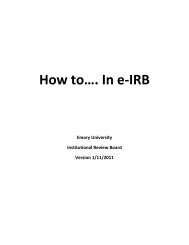A Manual for Participants in Clinical Trials of Investigational Agents ...
A Manual for Participants in Clinical Trials of Investigational Agents ...
A Manual for Participants in Clinical Trials of Investigational Agents ...
Create successful ePaper yourself
Turn your PDF publications into a flip-book with our unique Google optimized e-Paper software.
• Disapproved - In the judgment <strong>of</strong> the PRC, the protocol cannot be approved even<br />
with major revisions.<br />
8.4.4 The Review <strong>of</strong> the In<strong>for</strong>med Consent<br />
The PRC also reviews the <strong>in</strong><strong>for</strong>med consent document to be certa<strong>in</strong> that:<br />
• The document <strong>in</strong>cludes all required elements <strong>of</strong> <strong>in</strong><strong>for</strong>med consent mandated by<br />
Federal regulation; and<br />
• The description <strong>of</strong> potential benefits and adverse events is complete and<br />
accurate.<br />
Investigators should communicate changes made to the consent document result<strong>in</strong>g<br />
from a CTEP review to their IRBs.<br />
It is not CTEP’s <strong>in</strong>tent <strong>for</strong> their <strong>in</strong><strong>for</strong>med consent review to supplant IRB review.<br />
Provided the consent document meets the requirements <strong>of</strong> regulation and law and<br />
conta<strong>in</strong>s sufficient <strong>in</strong><strong>for</strong>mation to enable an <strong>in</strong>dividual to make an <strong>in</strong><strong>for</strong>med choice, the<br />
local IRB approval <strong>of</strong> the content is generally to be regarded as def<strong>in</strong>itive.<br />
Individual <strong>in</strong>stitutions may make m<strong>in</strong>or changes to the CTEP-reviewed <strong>in</strong><strong>for</strong>med consent<br />
<strong>for</strong>m. However, by the orig<strong>in</strong>ator <strong>of</strong> the <strong>in</strong><strong>for</strong>med consent document must approve any<br />
changes <strong>in</strong> risks or alternative procedures.<br />
8.4.5 The Review <strong>of</strong> Regulatory and Adm<strong>in</strong>istrative Concerns<br />
The PRC reviews each protocol to assure proper <strong>in</strong>structions <strong>for</strong> report<strong>in</strong>g adverse<br />
events are <strong>in</strong>cluded, an accurate and up-to-date pharmaceutical section is provided, and<br />
necessary <strong>in</strong>structions <strong>for</strong> multicenter trials are given, if appropriate<br />
8.4.6 The Review by the Pharmaceutical Collaborator<br />
In cases where a Pharmaceutical Collaborator is <strong>in</strong>volved, CTEP <strong>for</strong>wards protocols<br />
received to the Collaborator <strong>for</strong> review and comment approximately two weeks be<strong>for</strong>e it<br />
is reviewed by the PRC. CTEP discusses Collaborator comments if they are received<br />
be<strong>for</strong>e the Protocol Review Committee meet<strong>in</strong>g. They give them due consideration, and<br />
comments from either Collaborator or the CTEP staff that are agreed upon <strong>in</strong> the PRC<br />
meet<strong>in</strong>g are <strong>in</strong>cluded <strong>in</strong> the consensus review.<br />
8.4.7 The Consensus Review<br />
After the PRC meet<strong>in</strong>g, the primary reviewer generates a consensus review that states<br />
the PRC’s collective concerns. PIO sends this consensus review with a cover letter<br />
stat<strong>in</strong>g the summary PRC decision to the protocol orig<strong>in</strong>ator with<strong>in</strong> approximately 30<br />
days <strong>of</strong> receipt <strong>of</strong> a complete protocol.<br />
8.4.8 Respond<strong>in</strong>g to CTEP Consensus Review<br />
If the protocol or the <strong>in</strong><strong>for</strong>med consent requires revisions, the <strong>in</strong>vestigator should send a<br />
revised submission to the PIO. A complete submission <strong>in</strong>cludes the revised protocol<br />
and <strong>in</strong><strong>for</strong>med consent with a cover letter that details the responses to the po<strong>in</strong>ts raised <strong>in</strong><br />
the consensus review. If CTEP reviewers f<strong>in</strong>d the response satisfactory, then the<br />
protocol goes <strong>for</strong>ward <strong>for</strong> f<strong>in</strong>al approval.<br />
CTEP’s consensus reviewer may choose to send the revised protocol back to the full<br />
PRC <strong>for</strong> further consideration. If the PRC still does not accept the protocol, CTEP sends<br />
a letter to the <strong>in</strong>vestigator detail<strong>in</strong>g rema<strong>in</strong><strong>in</strong>g CTEP concerns. The <strong>in</strong>vestigator should<br />
Section 8 - Investigator’s <strong>Manual</strong> 2009 42




